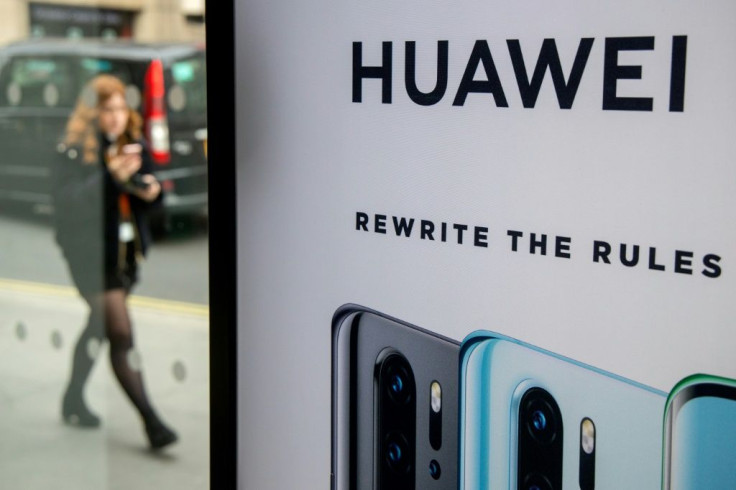UK Government Allows Huawei Limited Access To 5G Networks, Defying US Warnings

KEY POINTS
- U.S. officials warned the U.K. not to engage with Huawei, citing espionage, security fears
- U.K. allowed Huawei only a limited role in its 5G networks
- Australia and Japan have already banned Huawei
In defiance of pressure from the U.S., the British government said it will allow Chinese telecom firm Huawei to build noncritical parts of the country’s 5G network.
Britain’s National Security Council, a cabinet committee, determined that any security risks the Chinese company posed could be managed.
However, the U.K. will prohibit Huawei’s equipment from centralized parts of its 5G infrastructure that transport data across the network, as well as banning it from high security sites like military and nuclear installations.
“High-risk vendors have never been, and never will be, in our most sensitive networks,” said Ciaran Martin, the chief executive of Britain’s National Cyber Security Center, which is affiliated with the government.
Huawei will be able to participate in Radio Access Networks, or RAN, but no more than 35% of a single vendor’s equipment in this “nonsensitive” part of the network can be supplied by Huawei. (The RAN includes base stations and antennas which are used to provide a link between individual mobile devices and the core.)
“The cap at 35% ensures the U.K. will not become nationally dependent on a high-risk vendor while retaining competition in the market and allowing operators to continue to use two Radio Access Network vendors,” added the National Cyber Security Center.
Huawei Vice President Victor Zhang accepted the British government’s decision. “Huawei is reassured by the U.K. government’s confirmation that we can continue working with our customers to keep the 5G rollout on track. This evidence-based decision will result in a more advanced, more secure and more cost-effective telecoms infrastructure that is fit for the future,” he said.
Nonetheless, U.S. Secretary of State Mike Pompeo earlier warned the U.K. not to permit Huawei –which is closely tied to the Chinese Communist Party -- to work on its 5G infrastructure in order to protect its sovereignty. President Donald Trump and Treasury Secretary Steven Mnuchin have issued similar warnings.
“It’s critical that we have infrastructure that’s protected,” Mnuchin said over the weekend to a British audience. “These national security issues go beyond the traditional aspects.”
Australia and Japan have already banned Huawei from their networks.
U.S. officials also fear that Huawei is seeking to dominate the global telecom equipment market. Washington has also warned it may reduce intelligence sharing with London if they engaged with Huawei.
An official of the Trump administration said the US "is disappointed" with the decision.
Some members of Prime Minister Boris Johnson’s own Conservative party also criticized the move.
Conservative Member of Parliament Tom Tugendhat, former chair of the Foreign Affairs Select Committee, tweeted that the government's decision "does not close the U.K.'s networks to a frequently malign international actor,” in a reference to China.
Huawei officials have repeatedly denied accusations that its equipment would be used by Beijing to spy on other countries or compromise their infrastructure.
Britain’s decision came days before it is scheduled to leave the European Union – Johnson has long called for a 5G rollout but does not want to upset either the U.S. or China ahead of trade talks.
U.K. officials pointed out that Huawei is already deeply involved in British telecom infrastructure – uprooting them would cost billions of dollars. The British government estimated that Huawei had a 35% market share in 4G networks in the U.K.
Mobile UK, the British telecom industry body, praised the government decision.
“The mobile industry continues to believe that… in the interests of customers and the U.K.’s desire to be a global leader in 5G it must have access to a diverse supply chain that is open to the latest and most innovative technologies,” Hamish MacLeod, director at Mobile UK, said in a statement.
Britain’s largest telecom firm, BT Group, has already begun rolling out its 5G network using Huawei’s equipment.
Andy Purdy, the U.S. chief security officer at Huawei, downplayed the significance of U.K.’s decision. “Frankly, we don’t really see this as a win per se, this is a very small step and a process that began 15 years ago with the U.K.,” he said. “They have taken a very measured, a very somber approach to risk mitigation so they can get the benefits of technology.”
Purdy added that the 35% cap is a “very significant limitation.”
Still, the decision comes as a major disappointment to Huawei’s major rivals, Ericsson (ERIC) and Nokia (NOK).
Andrew Stark, a director at Red Mosquito, a British cybersecurity firm, noted that Huawei, Nokia and Ericsson are the only firms able to provide all the hardware needed to roll out a 5G network in the country.
“With Huawei… already integral to the UK 3G and 4G networks, shifting to 5G with them offers the path of least resistance and increases chances of telecom companies meeting tight roll-out targets,” he said. “There are currently only two other tech players capable of providing hardware for 5G, namely Nokia and Ericsson.”
Dimitris Mavrakis, a telecoms analyst at ABI Research, said the U.K.’s decision represented a "good compromise between alleviating 'security' concerns and making sure that the 5G U.K. market is not harmed. It means there will be minimal disruption to existing 5G rollout plans."
© Copyright IBTimes 2025. All rights reserved.





















